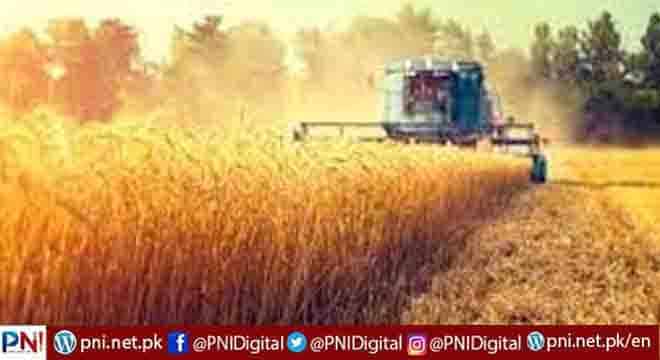By Muhammad Atif Ismail
MULTAN, Mar 15 (APP): With the world population nearing 7.9 billion, human beings are under severe threat of better environment and food security. Depleting water resource, land degradation, low per acre yield and rising edible items demand are posing enormous challenges to states and the governments.
Cognizant to this situation researches and agricultural experts had been toiling hard to explore modern techniques for optimum use of agriculture land. Side by side the industrial development, production of food item had also been central to their policies. Nations failing to cope with the emerging demand of edibles come across food deficiency and malnutrition sometimes leading to famines.
Pakistan is also not an exception to this phenomenon with successive governments trying to introduce modern techniques, better seeds and inputs, monetary incentives and raising awareness among farmers.
Their efforts are bearing fruit but still a lot is needed to fully exploit the potential in Punjab and Sindh provinces especially the South Punjab where 77% rural population is associated to agriculture.
Once the traditional methods of farming are replaced with modern techniques, agro-based industry in the region can be game changer for the country.
“South Punjab areas like Multan, Bahawalpur, Muzaffargarh, Layyah are rich in traditional farming since centuries. But, the modern day needs demand us to also promote olive, pulses and medicinal plants cultivation,” said Secretary Agriculture South Punjab Saqib Ateel.
He said the government is spending billions of rupees to enhance per acre yield and exploring new crops. “We have started our journey with olive cultivation in the mountainous region of Dera Ghazi Khan and Rajanpur.”
He said around one million olive plants are being planted in South Punjab besides grafting of five million olive trees in Bahawalpur and Koh-e-Suleman area. “We are also focusing on shrimps farming in saline areas and the agriculture department is providing all possible assistance to farmers.”
Facts and figures available with South Punjab Secretariat reveal that the region produces 98 % mangoes, 94 % cotton, 94 % black currant (falsa), 92% green chilli, 75 % sunflower, 73 onion, 49 % sugarcane, 46 % tomato, 45 % maize and 44 % wheat but unfortunately this potential could not be fully tapped over the period.
Pakistan Tehreek-Insaf led government introduced numerous measures to transform agriculture sector including Rs 300 billion PM’s Agriculture Emergency Program.
“We hope a turnaround by upgrading infrastructure and promoting high value crops by fully utilizing Rs 11 billion allocation by the provincial government for agriculture sector in South Punjab,” Saqib Ateel said.
He said presently we face a challenge of preserving about 50% mangoes, 45% citrus and 20 % tomato and other vegetables, going in waste. “Once we are able to successfully preserve our fruits and vegetable crops, the revenue would increase manifold.”
Recently, the farmers have also started cultivation of “Sagwan tree” as its wood is sold at nearly Rs 12,000 per cubic feet once the tree matures. Farmers have also started cultivation of medicinal plants with over 1000 kanal area in Multan, Khanewal and Bahawalpur districts being utilized for the purpose.
“As high value crops offer high economic returns, farmers have started exploring this area,” said Assistant Director Fruits and Vegetable Dr Qaisar.
He mentioned to cultivation of Fennel seed (soo’nf), Kalonji, Celery (Ajwine), Spaghetti (Ispghol), Basil (Tulsi) and Linseed (Alsi) and said, “we have been importing these seeds since decades. But, with their domestic cultivation we hope to save precious foreign exchange and ensure reasonable earning for local farmers.”
Amidst the government efforts, the farmers and agriculture experts have drawn the attention of the government towards laying down proper marketing mechanism and provision of quality seeds and cheaper agricultural inputs to revolutionize this sector.
“Main issue of this sector is cost of production,” said a progressive farmer Maj (Retd) Tariq. “The government should reduce cost of production by ensuring cheaper inputs as farmer often fall short of spending and fully utilize the potential of their land.”
He suggested to curb black marketing of agricultural inputs especially fertilizers, reduce electricity rates, ensure better access to markets and proper pricing for agriculture products. “We also need to encourage and incentivize corporate and export- based agriculture to help farmers earn more and contribute more to national economic growth.”
Another progressive farmer Khawaja Shoaib pointed out weaker implementation of laws and suggested improving the performance of regulatory bodies. “Farmers need protection and better prices for their goods and the government should improve the performance of concerned departments to properly facilitate farmers and protect their rights.”
He said the farmer need cheaper quality seed, best possible pesticides and easily available fertilizers. “But, when these commodities are provided at higher rates by hoarders, it minimizes profit ratio for farmers.”
He also underlined the need for more research work and shatter the cartels busy in fleecing the farmer, making it hard for them to earn respectable living.
Keeping in view the prevailing situation, there is dire need for promoting modern technology, encourage progressive farming, provide cheaper inputs, proper marketing mechanism to ensure better prices of produce and export opportunities for farmers to revolutionize this sector and earn revenue for national kitty.
Follow the PNI Facebook page for the latest news and updates.









